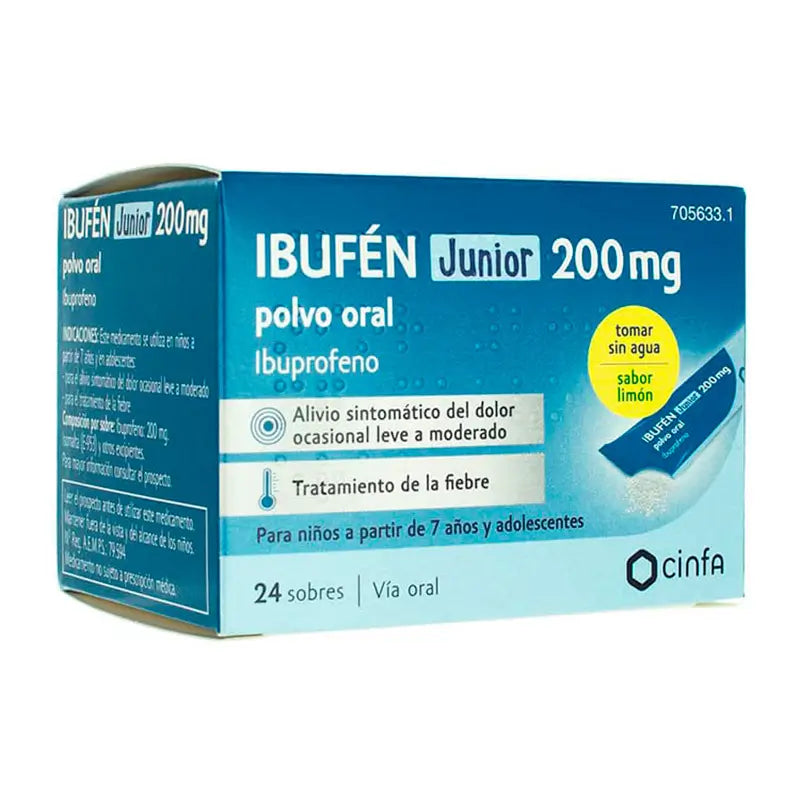Sachets with ibuprofen for the symptomatic relief of occasional mild to moderate pain and the treatment of fever in children from 7 years of age.
Contains 24 sachets.

It is a medicine formulated with ibuprofen, an active substance withanti-inflammatoryproperties forthe symptomatic relief of occasional mild to moderate pain and fever.
Suitable for use in adolescents andchildren from7 years of age.
The recommended dose varies according to the age and weight of the patient. As a guideline, the recommendations in the table below can be followed:
|
Age |
Weight |
Dose |
Maximum dose(mg) |
|
|
7-9 years |
Approx. 21 kg to 29 kg |
200 mg (1 sachet / 3 times a day ) |
600 mg |
|
|
10-12 years |
Approx. 30 kg to 40 kg |
200 mg (1 sachet / 3-4 times a day ) |
800 mg |
|
|
Adolescents over 12 years |
>40 kg |
200 - 400 mg (1-2 sachets / 3-4 times a day ) |
1,200 mg |
|
Like all medicines, this medicine may cause side effects, although not everybody suffers from them. In this case, the following have been observed
Gastrointestinal disorders
Skin and subcutaneous tissue disorders
Severe allergic reaction which may manifest with nausea, vomiting, swelling of the face, tongue and throat, difficulty breathing, asthma, palpitations, hypotension or shock.
Nervous system disorders
Psychiatric disorders
Consult your doctor or pharmacist before you start taking this medicine:
If you have had or develop an ulcer, bleeding or perforation in the stomach or duodenum, which may be manifested by severe or persistent abdominal pain and/or black stools, or even without previous warning symptoms.
This risk is higher when using high doses and prolonged treatment, in patients with a history of peptic ulcer and in elderly patients. In these cases your doctor will consider the possibility of adding a stomach-protecting medicine.
If you have had kidney or liver disease.
If you have oedema (fluid retention).
If you have asthma or any other breathing disorder.
If you are taking this medicine, as ibuprofen may mask fever, which is an important sign of infection, making it difficult to diagnose.
If you have or have ever had a heart disorder or high blood pressure.
If you have kidney or liver disease, are over 60 years old, or need to take the medicine for a long time (more than 1 to 2 weeks), your doctor may need to check you regularly. Your doctor will tell you how often you should be checked.
If you develop symptoms of dehydration, e.g. severe diarrhoea or vomiting, drink plenty of fluids and contact your doctor immediately, as ibuprofen in this particular case could lead to kidney failure as a result of dehydration.
If you are simultaneously taking medicines that affect blood clotting, such as oral anticoagulants, antiplatelet agents such as acetylsalicylic acid. You should also discuss the use of other medications that may increase the risk of such bleeding, such as corticosteroids and selective serotonin reuptake inhibitor antidepressants.
If you suffer from Crohn's disease or ulcerative colitis, as medicines of this type may worsen these pathologies.
If you are being treated with diuretics (medicines for urination) because your doctor must monitor your kidney function.
If you have systemic lupus erythematosus (a chronic disease that affects the immune system and can affect various vital organs, the nervous system, blood vessels, skin and joints). If you have systemic lupus erythematosus (a chronic disease affecting the immune system that can affect various vital organs, the nervous system, blood vessels,skin and joints) , asaseptic meningitis (inflammation of the meninges, the membranes that protect the brain and spinal cord, not caused by bacteria)is more likely tooccur.
If you have acute intermittent porphyria (a metabolic disease that affects your blood and can cause symptoms such as reddish urine, blood in urine or liver disease), to assess whether or not you should be treated with ibuprofen.
If you suffer from headaches after prolonged treatment, you should not take higher doses of the medicine.
If you have an infection; see the heading "Infections" below.
Allergic reactions are possible with this medicine.
Your doctor will monitor you more closely if you receive ibuprofen after major surgery.
It is advisable not to take this medicine if you have chickenpox.
The active substance is ibuprofen. Each sachet of Ibufen Junior contains 200 mg of ibuprofen. The other excipients are:Isomalt (E-953), anhydrous citric acid, acesulfame potassium (E-950), glycerol distearate (type I) and lemon flavouring (natural flavourings, maltodextrin and alpha-tocopherol (E-307)).
A doctor should be consulted if it gets worse or if it does not improve after 3 days. Do not take on an emptystomach, takemore than the maximum recommended dose or expose yourself to sunlight if you have taken ibufen.
Read the package leaflet included with this medicine carefully. If you have any questions about this product, please consult our team of pharmaceutical experts.
The price of over-the-counter medicines is
